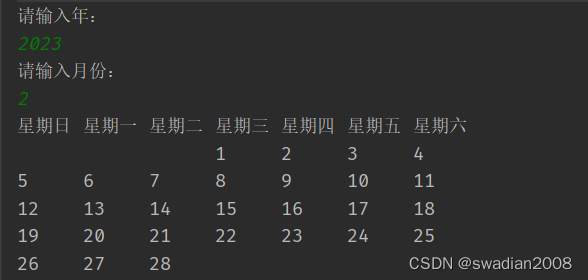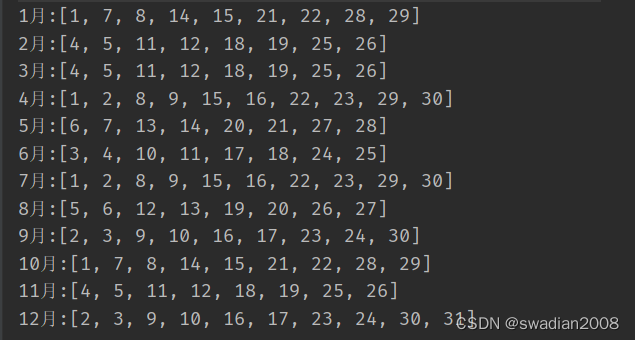目录
(1)通过 Java 的基本语法来实现万年历
在 Java 的时间计算方面还有很多好用的工具类,Java 常用的工具类封装框架链接如下:HUTool 框架官网
package com.taier.pulsar.date_utils;
import java.util.Scanner;
/**
* @author swadian2008
*/
public class DateUtils {
public static void main(String[] args) {
Scanner sc = new Scanner(System.in);
System.out.println("请输入年:");
int year = sc.nextInt();
System.out.println("请输入月份:");
int month = sc.nextInt();
//1.计算1900.1.1到输入年的天数
int dayOfYear = 0;
for (int i = 1900; i < year; i++) {
if (i % 4 == 0 && i % 100 != 0 || i % 400 == 0) { // 闰年
dayOfYear += 366;
} else {
dayOfYear += 365;
}
}
//2.计算1月到输入月的天数
int dayOfMonth = 0;
for (int i = 1; i < month; i++) {
switch (i) {
case 1:
case 3:
case 5:
case 7:
case 8:
case 10:
case 12:
dayOfMonth += 31;
break;
case 4:
case 6:
case 9:
case 11:
dayOfMonth += 30;
break;
case 2:
if ((year % 4 == 0) && (year % 100 != 0) || (year % 400 == 0)) {
dayOfMonth += 29;
} else {
dayOfMonth += 28;
}
break;
}
}
//3.获取输入月的天数
int day = 0;
switch (month) {
case 1:
case 3:
case 5:
case 7:
case 8:
case 10:
case 12:
day = 31;
break;
case 4:
case 6:
case 9:
case 11:
day = 30;
break;
case 2:
if ((year % 4 == 0) && (year % 100 != 0) || (year % 400 == 0)) {
day = 29;
} else {
day = 28;
}
break;
}
//4.计算星期
int allDay = dayOfYear + dayOfMonth + 1;
int week = allDay % 7; // 计算余数在星期中的位置
int count = 0;// 计数器,记录日期的空格
System.out.println("星期日\t星期一\t星期二\t星期三\t星期四\t星期五\t星期六");
//5.打印空格
for (int i = 1; i <= week; i++) {
System.out.print("\t\t\t");
count++;
}
//6. 打印日历
for (int i = 1; i <= day; i++) {
if (i < 10) { // 为了格式化
System.out.print(i + "\t\t\t");
} else {
System.out.print(i + "\t\t");
}
count++;
//若记录数是七的倍数,换行输出
if (count % 7 == 0) {
System.out.println();
}
}
}
}打印效果如下:

(2)Java 获取一年中所有的周六和周日
下边的示例中使用了一个Map来收集周六和周日,可以根据需要进行调节:
import static java.time.temporal.TemporalAdjusters.firstInMonth;
import java.time.DayOfWeek;
import java.time.LocalDate;
import java.time.Month;
import java.time.Period;
import java.util.ArrayList;
import java.util.Arrays;
import java.util.Collections;
import java.util.HashMap;
import java.util.LinkedHashMap;
import java.util.List;
import java.util.Map;
import java.util.Map.Entry;
import java.util.stream.Collectors;
import com.baomidou.mybatisplus.core.toolkit.CollectionUtils;
/**
* @author swadian2008
*/
public class WeekDay {
public static void main(String[] args) {
// 创建代表一年中第一天的LocalDate对象。
int year = 2023;
LocalDate now = LocalDate.of(year, Month.JANUARY, 1);
Map<String, List<Integer>> weekMap = new HashMap<>(12);
// 第一个星期六
LocalDate saturday = now.with(firstInMonth(DayOfWeek.SATURDAY));
do {
String satMonth = String.valueOf(saturday.getMonthValue());
if (CollectionUtils.isEmpty(weekMap.get(satMonth))) {
weekMap.put(satMonth, new ArrayList<>(Arrays.asList(saturday.getDayOfMonth())));
} else {
List<Integer> values = weekMap.get(satMonth);
values.add(saturday.getDayOfMonth());
Collections.sort(values);
weekMap.put(satMonth, values);
}
// 迭代一个星期
saturday = saturday.plus(Period.ofDays(7));
} while (saturday.getYear() == year);
// 第一个星期天
LocalDate sunday = now.with(firstInMonth(DayOfWeek.SUNDAY));
do {
String sunMonth = String.valueOf(sunday.getMonthValue());
if (CollectionUtils.isEmpty(weekMap.get(sunMonth))) {
weekMap.put(sunMonth, new ArrayList<>(Arrays.asList(sunday.getDayOfMonth())));
} else {
List<Integer> values = weekMap.get(sunMonth);
values.add(sunday.getDayOfMonth());
Collections.sort(values);
weekMap.put(sunMonth, values);
}
// 迭代一个星期
sunday = sunday.plus(Period.ofDays(7));
} while (sunday.getYear() == year);
Map<String, List<Integer>> sortWeekMap = weekMap.entrySet().stream().sorted((e1, e2) ->
Integer.compare(Integer.parseInt(e1.getKey()), Integer.parseInt(e2.getKey())))
.collect(Collectors.toMap(Map.Entry::getKey, Map.Entry::getValue, (e1, e2) -> e1,
LinkedHashMap::new));
for (Entry<String, List<Integer>> map : sortWeekMap.entrySet()) {
System.out.println(map.getKey() + "月:" + map.getValue().toString());
}
}
}打印效果如下:

(3)Java 节假日导入导出
Java 节假日导入导出会要操作一些 excel 文件,推荐使用 Easy Excel
使用该框架后,就不再需要写原生的 POI 了,而且在数据量方面也提供了相关的解决方案。
导入 Excel 文件示例
文件上传的 Controller.calss 示例
/**
* 导入节假日管理信息
* @param file
*/
@PutMapping("/file" )
public void uploadHolidays(@RequestParam("file") MultipartFile file) throws IOException {
return HolidaysService.uploadHolidays(file);
}上传过程 ServiceImpl.calss 示例
// 上传数据,并返回上传的数据:这里有一个监听器,此监听器并非 Spring 进行管理
public String uploadHolidays(MultipartFile file) throws IOException {
List<ConfigureHolidaysVO> holidaysVOS = EasyExcel.read(file.getInputStream(), ConfigureHolidaysVO.class,
new HolidaysDataListener(this)).sheet().doReadSync();
return true;
}监听器的简单示例
@Slf4j
public class HolidaysDataListener implements ReadListener<ConfigureHolidaysVO> {
private ConfigureHolidaysService holidaysService;
public HolidaysDataListener(ConfigureHolidaysService holidaysService) {
this.holidaysService = holidaysService;
}
private static final int BATCH_COUNT = 100;
/**
* 缓存的数据
*/
private List<ConfigureHolidaysVO> cachedDataList = ListUtils.newArrayListWithExpectedSize(BATCH_COUNT);
@Override
public void invoke(ConfigureHolidaysVO data, AnalysisContext context) {
log.info("解析到一条数据:{}", JSON.toJSONString(data));
cachedDataList.add(data);
if (cachedDataList.size() >= BATCH_COUNT) {
saveData();
// 存储完成清理 list
cachedDataList = ListUtils.newArrayListWithExpectedSize(BATCH_COUNT);
}
}
@Override
public void doAfterAllAnalysed(AnalysisContext context) {
// 确保最后遗留的数据存储到数据库
saveData();
log.info("所有数据解析完成!");
}
/**
* 加上存储数据库
*/
private void saveData() {
log.info("{}条数据,开始存储数据库!", cachedDataList.size());
holidaysService.saveBatchHolidaysVOs(cachedDataList);
}
}导出 Excel 文件示例
文件导出的 Controller.calss 示例
/**
* 导出节假日管理信息
* @param response
*/
@GetMapping("/{year}/file" )
public void downloadHolidays(HttpServletResponse response, @PathVariable String year) throws IOException {
HolidaysService.downloadHolidays(year, response);
}导出过程 ServiceImpl.calss 示例:当直接把数据流写入 HttpServletResponse 时,就可以直接在浏览器中下载导出的文件,当然也可以把文件写入到指定的路径,详情请查阅文档。
/**
* 数据导出
*/
public void downloadHolidays(String year, HttpServletResponse response) throws IOException {
response.setContentType("application/vnd.openxmlformats-officedocument.spreadsheetml.sheet");
response.setCharacterEncoding("utf-8");
String fileName = URLEncoder.encode(year + "年节假日数据导出", "UTF-8").replaceAll("\\+", "%20");
response.setHeader("Content-disposition", "attachment;filename*=utf-8''" + fileName + ".xlsx");
EasyExcel.write(response.getOutputStream(), ConfigureHolidaysVO.class).sheet(year).doWrite(holidaysData(year));
}
/**
* 获取存储在数据库中的节假日数据
* @param year
* @return
*/
private List<ConfigureHolidaysVO> holidaysData(String year) {
return list(
Wrappers.lambdaQuery(ConfigureHolidays.class).eq(ConfigureHolidays::getAdjustYear, year))
.stream().map(r -> {
ConfigureHolidaysVO vo = new ConfigureHolidaysVO();
BeanUtils.copyProperties(r, vo);
List<Integer> dayList = JSON.parseObject(r.getAdjustDays(), List.class);
vo.setAdjustDays(dayList);
return vo;
}).sorted(Comparator.comparing(e -> Integer.valueOf(e.getAdjustMonth()))).collect(Collectors.toList());
}因为节假日的导入导出重点在于 POI 操作 ,并非本文重点,有关更加详细的 POI 操作请查阅 easy excel 文档。
版权声明:本文为swadian2008原创文章,遵循CC 4.0 BY-SA版权协议,转载请附上原文出处链接和本声明。